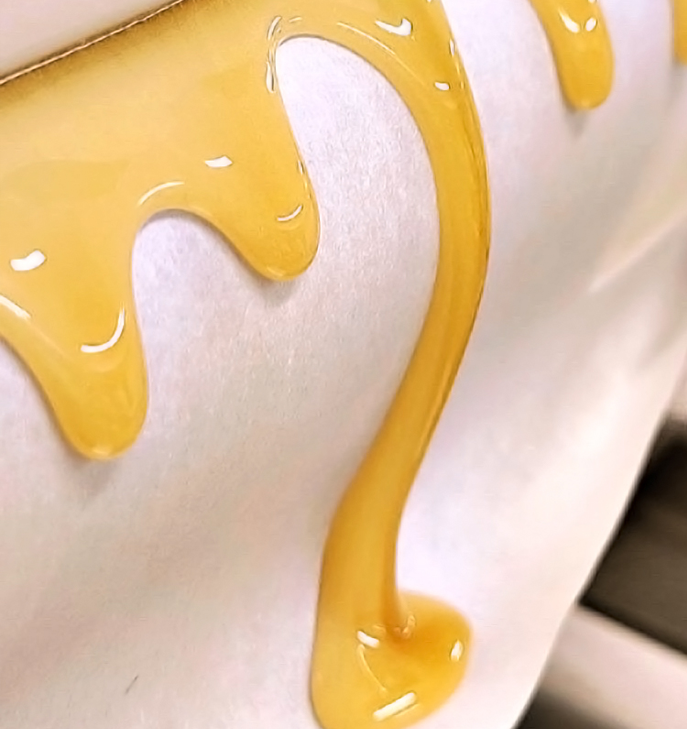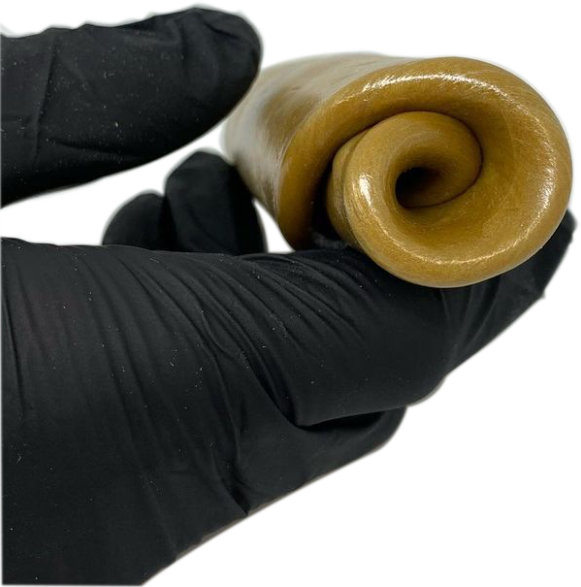Solventless concentrates gave Cody Coulson a path into the legal cannabis market. His nose for top tier inputs isn’t the only thing separating him from the pack
With the barrel of a handgun in his face and a friend sobbing on his shoulder Cody Coulson froze. Rush hour’s thick foot traffic streamed past downstairs, completely ignorant of the robbery taking place above them.
“Don’t die over this,” the kid with the gun said. “It’s illegal.”
At only 18 years old Coulson had moved to Toronto to learn more about cannabis, eventually embedding himself in the culture as a budding expert in concentrates. He filled his own medical prescription at several dispensaries and it was on one of these trips that two young men in hoodies burst in.
“Don’t die over this!” the kid yelled again.
“I’m not gonna!” Coulson yelled back. “But I don’t have any cash!” He noticed the kid look into the storage room over Coulson’s shoulder. “There’s cannabis canisters back there. Just take them.”
The armed robbers cleaned out the back office and the storage room before finally leaving. It was then the manager came down.
“Is everyone O.K.?”
Yes, Coulson said.
As he waited on the curb for his brother to pick him up Coulson noticed his hands shaking. The whole situation seemed surreal. Hundreds and hundreds of people walked past him. Not a single one knew he just had a gun pointed at his head. It was as though it had never happened at all. He cried.
When Coulson was 15 years old his father passed away from cancer. During treatment his father’s friends brought Coulson’s dad a joint to help ease the pain of chemotherapy.
“After a long time of him going downhill it was one day of him eating and smiling and laughing,” Coulson says.
Before his father’s death Coulson had never smoked cannabis. After this traumatic period he began an insatiable search for more information. He spent his teenage years in his home town of Port Elgin processing the emotional turmoil caused by his father’s early passing. His behaviour eventually forced his mother to kick him out and he found himself living in friends’ garages. It wasn’t until he moved to Toronto and started exploring the burgeoning cannabis culture that his learning truly accelerated.
“I started learning more and more about THC and CBD and the pharmacological aspects of it,” Coulson says.
He worked a door-to-door sales job to afford rent while he sought a legal path into the industry.
After a shift of door-knocking he’d use flower from his own medical prescription to experiment with extraction methods he’d heard about at dispensaries. First came butane. Then he switched to a panini press and clamps to press rosin for other patients. Coulson continued educating his family about the medical benefits of cannabis and when the robbery occurred at the dispensary in Toronto they were ready to support him in a new endeavour. The legalization of recreational cannabis beckoned.
“I knew I wanted to get in but my family doesn’t come from wealth,” Coulson says. “I needed an outside the box idea.”

The barn in Port Elgin needed to be sprayed down. Four inches of cowshit covered the floorboards but Coulson and Kurtis Ohm, one of Coulson’s partners in his new endeavour, didn’t mind. They got down to work immediately.
“Kurtis is a handyman of all trades,” Coulson says. “Best fucking hashmaker you’ll ever meet.”
Once the cow crap had been washed away Ohm began framing the barn to Coulson’s specifications. The two are old high school classmates. They had put their own money into the venture but always knew they’d need more. Coulson turned to his experience knocking on doors to steel himself for the eventual rejection he’d face from potential investors. This time though there was a key difference.
“Running a script you have to learn how to control the conversation, use your emotions and smile to help. When you’re authentic, you don’t need to think about any of that stuff it just happens naturally,” Coulson says. “When you know what you’re talking about you don’t have to fake it. People can tell the difference between authenticity and faking it.”
It wasn’t long before they found a partner in Joshua Herman of Herman Holdings. “His forte is the money,” Coulson says, “my forte is the cannabis. Together we make a really, really good team.”
One of the reasons Coulson’s operation is attractive is the lower risk associated with it. He doesn’t grow his own product for a few reasons but chief among them is the uncertainty.
“I respect it too much,” he says. “It’s difficult to do at scale. I knew I had a chance in the extract game. I did not have a chance growing. I get to pick and choose good cannabis—and I know good cannabis—so there’s no risk in my opinion.”
He lists all the variables that can impact a grow: seed quality, growing environment, post-processing constraints (drying, curing, packaging). If even one of those is off it can have a massive impact on a company’s profitability. Coulson’s years of experience handling, inspecting, exploring and educating people about cannabis have imbued him with an intuition for what constitutes good product. It’s akin to a stock trader’s “feel” for the market or a surfer timing their pop up on a wave. You can’t really describe it to someone else. You just have to know.
“We’re consumers as well. We really care about the product we put out. We’re not after the money, we’re after a good industry. That’s all we want.”
– Cody Coulson
When you ask him how he chooses the cultivars he again lists a number of variables: cuticle size of the trichomes, bud density, coloration and size of trichome heads, stalk length, terpene profile, overall sensation, growing method, drying method and so on. It’s another exhaustive list of variables with no definite numbers: just a subjective impression based on what the plant and grower manage to create together.
One thing is for sure, the freshness of the dried bud impacts the quality of an extract. As trichome heads mature they grow in size, filling with CBG (the precursor to THCa and CBDa), terpenes and other lipids. The longer a trichome is exposed to oxygen the more these molecules degrade, slowly turning the trichome a progressively darker shade of amber. A careful grower will theoretically pull a harvest the day before the first amber trichome head.
When Coulson is asked for tips on pressing rosin at home he laments that most product is far too oxidized to yield a stable product simply due to time spent in distribution.
“99 percent of what we test we don’t use,” he says, “because it’s not yielding stable, quality oil.”
The world of cannabis concentrates can be split roughly in two: those made with solvents (such as butane or CO2) and those made in a solventless manner.
“Solventless is the truest representation of the strain’s genetics and how they were grown,” Coulson says.
An example of a solventless product is flower rosin. It’s made by applying pressure and heat in a very careful way to dry flower, forcing the trichome lipids to “run” out onto a sheet of parchment paper. It’s what Coulson did with the panini press in Toronto.
Now, in addition to pressing flower, Coulson refines freshly frozen cannabis flower to collect and press a premium solventless extract called water hash. With the right strain trichome heads contain predominantly hydrophobic molecules. They will not dissolve in water. To make water hash Coulson runs cold water, in a cold room, over cold cannabis into a series of filter bags, each one smaller than the last.

Many products currently on the market use the term “live”. This indicates the buds were frozen immediately after harvest and were pressed in a colder state than something like flower rosin, which is made from dried and cured bud. Also known as “WPFF” or “Whole Plant Fresh Frozen” the process of keeping the flower cold prevents the more volatile monoterpenes from breaking down during post-harvest processing.
“Monoterpenes off-gas at lower temperatures and are much more flavourful and ‘loud’,” Coulson says. “They’re a better representation of the living plant’s smell and flavour.”
As the trichome heads are picked up off the plant by the rushing water, they’re then filtered into different groups based on their size (anywhere between 25-220 microns). Later, the water hash can be used to make a range of solventless concentrates with different effects, textures and aromas.
Coulson Cannabis, the licensed producer, will be launching two brands of concentrates in the coming months. PortNorth is what Coulson terms an “everyday” user’s brand. They’ll be launching three premium flower rosins: Mandarin Cookies, Lemon Zkittles and Black Cherry Punch in both 0.5g and 1g formats.
The other brand he’ll be launching is called Persy. He says the intention with Persy is to provide products in a “higher echelon”. Under the Persy brand Coulson is using Carmel Cannabis flower to bring products like a Full Spectrum Animal Face Cold Cured Live Rosin Batter to market.
“It’s a lot of work to find people who aren’t cutting corners,” Coulson says. “You have to look at the smaller, independent and more passionate growers to be able to source premium input flower.”
The coming months will be a telling moment for both the industry and Coulson Cannabis. A regulatory review at the federal level may result in many of the advertising restrictions and THC limits lifted, leaving space for the sector itself to run like the rosin being pressed in Port Elgin.
“I think we’re causing a little bit of excitement because we’re authentic,” Coulson says. “We’re consumers as well. We really care about the product we put out. We’re not after the money, we’re after a good industry. That’s all we want.”



